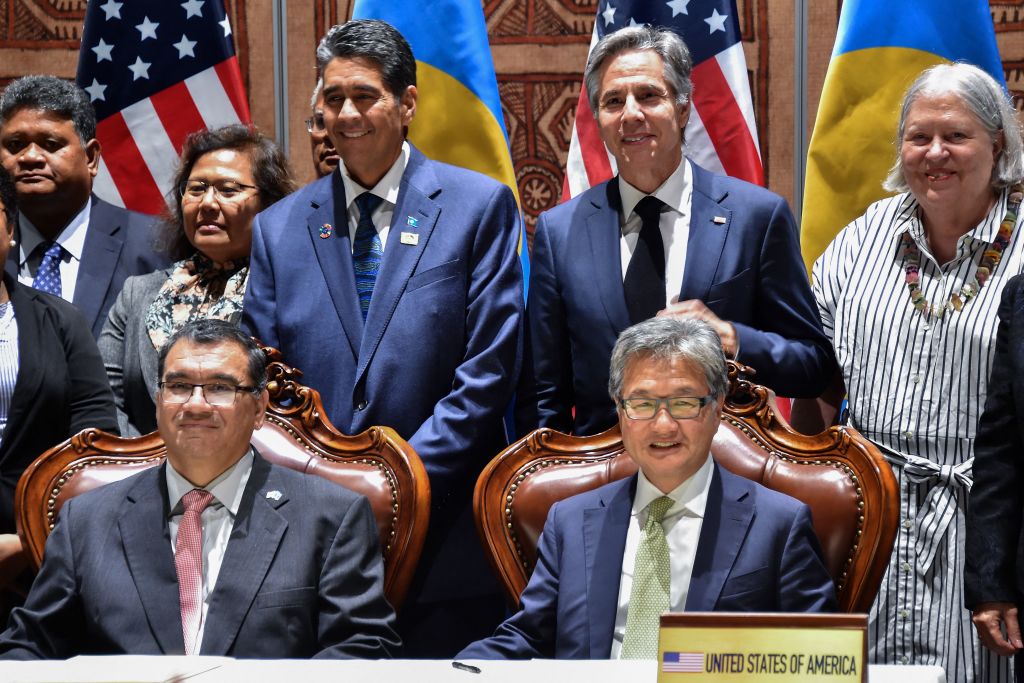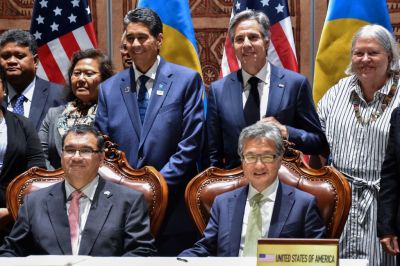NGERULMUD, Palau—A tiny Pacific island nation with a population of 18,000 that few Americans can find on the map could be pivotal to defending Taiwan from a Chinese invasion. Even as the Pentagon builds capacity on Palau, however, China is hard at work trying to undermine the U.S.-aligned government—or even flip it.
Older Americans remember Palau for the brutal World War II battles of Angaur (nearly 200 American deaths) and Peleliu (more than 1,500 American deaths). Today it’s a remote but somewhat popular destination for divers, who relish the country’s pristine coral reefs. But the U.S. military sees value here because it is a mere three-and-half hour flight from Taipei, the capital of Taiwan. Such proximity could prove useful for stationing air and sea vessels, not to mention personnel.
America currently enjoys a “Compact of Free Association” with Palau. The agreement closely links the country with the U.S.: Palauans can work stateside, and they serve in the U.S. military at high rates. They use the U.S. dollar. They even have an American postal code.
Meanwhile, the United States is responsible for Palau’s defense and security, and provides substantial services and financial support that annually accounts for more than two-thirds of its $97 million per annum budget. The financial and services components of the compact are periodically renegotiated and renewed. We are currently in a sensitive phase whereby the agreement has been struck, but Congress has yet to sign off. Assuming this one is signed, the next one will not be up for reneweal for another 20 years.
There is talk now about lengthening and hardening the runway of the international airport near the town of Koror, to potentially accommodate F-35 fighter jets and C-17 transport aircraft. More tangibly, new radar installations, which could help the U.S. detect and deter Chinese aircraft in the event of a Taiwan invasion, are being built across Palau.
However, the radar installations have upset the people of Angaur, a tiny remote island about 90 minutes by boat from the main island. The military has uprooted untold numbers of trees, displacing birds and monkeys. The locals now fear the influx of hundreds of contractors—not to mention the specter of another Pacific war.
It’s not a good time to make the locals unhappy. Palau’s agreement with Washington is not ironclad. Palau is one of three “Freely Associated States” (along with the Federated States of Micronesia and the Marshall Islands). It has been mutually beneficial, but nothing is guaranteed. As China ramps up its overt and covert influences in the region, there are significant national security implications.
Palau is just one of 12 countries (plus the Vatican) that recognizes Taiwan. After speaking to multiple officials, it appears that Beijing’s priority is to push Palau to rescind this position. Chinese nationals are visiting the island with increased frequency. Charter flights now arrive somewhat regularly from the mainland, and there is a push to establish permanent routes. Nearly every Palauan you meet will readily cede that Chinese “tourists” are leasing Palauan property (sometimes near military installations) and gaining financial influence by injecting cash into this tiny economy. One official claimed outright that the Chinese have offered Palau $100 million to rescind its recognition of Taiwan and align with Beijing.
Even if it fails to flip Palau, the Chinese have already succeeded in installing Huawei telecoms equipment across the country, potentially granting Beijing the ability to gain access to sensitive information about the local population, not to mention the Americans preparing for military expansion. The Palau government said there were plans to tear out the Chinese giant’s telecom equipment back in 2021. However, the State Department in June announced plans to “modernize” the network—an apparent tacit admission that its previous plans failed to materialize.
Beijing, however, has already signaled that it has even greater leverage over Palau’s telecommunications. In May, a Chinese “research vessel” entered Palau’s exclusive economic zone and slowed over the undersea fiber optic cable that serves as the country’s lifeline to the outside world. This was the fourth such incursion, sparking widespread concern among the locals. Indeed, the Chinese gave Palau a taste of its gray zone warfare tactics now common across Asia.
Palau sustains a modest maritime force, with vessels donated from Japan and elsewhere. When the Chinese vessel arrived in May, it did so under the cover of a strong storm. Palau didn’t even have a large enough vessel to dispatch in that kind of weather. The PLA Navy almost certainly knew that in advance. The Palauan government could do little more than monitor the situation.
Previous Chinese incursions into Palau’s waters prompted President Surangel Whipps Jr. to issue a rare public call for help in January. But the U.S. has yet to publicly respond.
There are higher-value pieces of real estate than Palau in the Asian theater that the U.S. Navy must defend. Still, the value of this tiny nation, as well as the other small Pacific island countries that have come under pressure from China, should not be underestimated. Eighty years after the last world war, great power competition has returned to the Pacific islands.






Please note that we at The Dispatch hold ourselves, our work, and our commenters to a higher standard than other places on the internet. We welcome comments that foster genuine debate or discussion—including comments critical of us or our work—but responses that include ad hominem attacks on fellow Dispatch members or are intended to stoke fear and anger may be moderated.
With your membership, you only have the ability to comment on The Morning Dispatch articles. Consider upgrading to join the conversation everywhere.